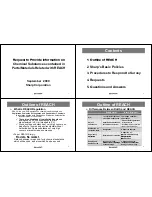
MDL Standards
You can configure channelized T3 interfaces to send MDL messages that comply with
ANSI T1.107a-1990 Standard for Telecommunications—Digital Hierarchy – Supplement
to Formats Specification (August 1990). MDL messages identify a particular link by
sharing common codes for data such as the equipment identifier, line identifier, frame
identifier, and unit.
FDL Standards
Similarly, you can configure T1 channels to send FDL messages that comply with either
or both of the following standards:
•
ANSI T1.403-1989 Standard for Telecommunications—Network and Customer
Installation Interfaces – DS1 Metallic Interface – Robbed-bit Signaling State Definitions
(1989)
FDL messages that comply with the ANSI standard identify a particular link by sharing
common codes for data such as the equipment identifier, line identifier, frame identifier,
and unit.
•
AT&T Technical Reference 54016—Requirements for Interfacing Digital Terminal
Equipment to Services Employing the Extended Superframe Format (September 1989)
FDL messages that comply with the AT&T standard identify a particular link by sharing
performance data and do not use common codes for data such as the equipment
identifier, line identifier, frame identifier, and unit.
Timeout of Received MDL and FDL Messages
When a line module receives an MDL or FDL message string, it stores the strings for a
period of 10 seconds after the last message was received. If the line module does not
receive another message of any type containing the same string within 10 seconds, it
erases the local copy of the message.
Most MDL and FDL message strings are common to all three types of messages that can
be transmitted: path identifications, idle signals, and test signals. Certain message strings,
however, are unique to a particular message type. Table 3 on page 4 briefly describes
each MDL/FDL message string and indicates, with a checkmark (
✓
), the types of messages
in which it can be sent.
Table 3: MDL and FDL Message Strings and Message Types
Test Signal
Message
Idle Signal
Message
Path
Message
Description
Message
String
✓
✓
✓
Equipment identification code
eic
✓
✓
✓
Frame identification code
fic
✓
–
–
Generator number
generator
✓
✓
✓
Line identification code
lic
–
–
✓
Facility identification code
pfi
Copyright © 2010, Juniper Networks, Inc.
4
JunosE 11.2.x Physical Layer Configuration Guide
Summary of Contents for JUNOSE 11.2.X MULTICAST ROUTING
Page 6: ...Copyright 2010 Juniper Networks Inc vi...
Page 8: ...Copyright 2010 Juniper Networks Inc viii JunosE 11 2 x Physical Layer Configuration Guide...
Page 16: ...Copyright 2010 Juniper Networks Inc xvi JunosE 11 2 x Physical Layer Configuration Guide...
Page 24: ...Copyright 2010 Juniper Networks Inc 2 JunosE 11 2 x Physical Layer Configuration Guide...
Page 66: ...Copyright 2010 Juniper Networks Inc 44 JunosE 11 2 x Physical Layer Configuration Guide...
Page 228: ...Copyright 2010 Juniper Networks Inc 206 JunosE 11 2 x Physical Layer Configuration Guide...
Page 247: ...PART 2 Index Index on page 227 225 Copyright 2010 Juniper Networks Inc...
Page 248: ...Copyright 2010 Juniper Networks Inc 226 JunosE 11 2 x Physical Layer Configuration Guide...
















































